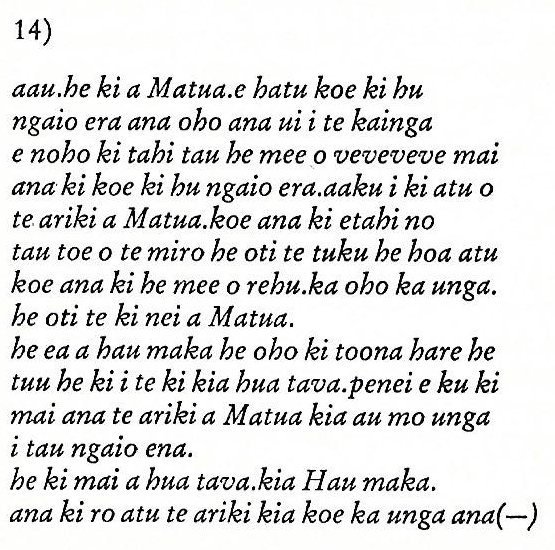

| he ki mai te tangata taina ko hua
tava.ka oho |
The brother (taina)
Hua Tava spoke: 'Go and let King Hotu Matua know
about your dream!' |
| koe ka hakamaa i te atua o te po
ki te ariki |
| kia Matua. |
|
Oho. 1. To
go: ka-oho! go! go away! (i.e. 'goodbye' said
by the person staying behind); ka-oho-mai
(very often contracted to: koho-mai),
welcome! (lit.: come here); ku-oho-á te tagata,
the man has gone. Ohoga, travel,
direction of a journey; ohoga-mai, return. 2.
Also rauoho, hair. Vanaga. 1. To delegate;
rava oho, to root. 2. To go, to keep on going,
to walk, to depart, to retire; ka oho,
begone, good-bye; oho amua, to preced; oho
mai, to come, to bring; oho arurua, to
sail as consorts; hakaoho, to send, a
messenger. 3. Tehe oho te ikapotu, to abut,
adjoin; mei nei tehe i oho mai ai inei te ikapotu,
as far as, to; kai oho, to abstain, to
forego; hakaoho, to put on the brakes. 4. The
head (only in the composite rauoho, hair).
Churchill. |
| he oho a Hau maka.he hakamaa i te
atua |
Hau Maka went to tell
the king about the dream. When he arrived there, he
told his dream. He described the dream in detail,
including all lands his [toona] dream soul
had seen.
He omitted nothing whatsoever. |
| o te po ki te ariki kia Matua.he
tuu he ha(-) |
| kamaa i te atua o te po he hakahi
tahi |
| i te atua o te po anakeanake te
kainga ui e(-) |
| ra e toona kuhane kai toe kai
tohe etahi. |
| Ana. 1. Cave. 2.
If. 3. Verbal prefix: he-ra'e ana-unu au i te
raau, first I drank the medicine. Vanaga.
1. Cave, grotto, hole in the rock. 2. In order that,
if. 3. Particle (na 5); garo atu ana,
formerly; mee koe ana te ariki, the Lord be
with thee. PS Sa.: na, an intensive
postpositive particle. Anake, unique. T Pau.:
anake, unique, to be alone. Mgv.: anake,
alone, single, only, solely. Mq.: anake,
anaé, id. Ta.: anae, all, each, alone,
unique. Anakena, July. Ananake,
common, together, entire, entirely, at once, all,
general, unanimous, universal, without distinction,
whole, a company; piri mai te tagata ananake,
public; kite aro o te mautagata ananake,
public; mea ananake, impartial; koona
ananake, everywhere. Churchill. Splendor; a name
applied in the Society Islands to ten conspicious
stars which served as pillars of the sky. Ana
appears to be related to the Tuamotuan ngana-ia,
'the heavens'. Henry translates ana as
aster, star. The Tahitian conception of the sky
as resting on ten star pillars is unique and is
doubtless connected with their cosmos of ten
heavens. The Hawaiians placed a pillar (kukulu)
at the four corners of the earth after Egyptian
fashion; while the Maori and Moriori considered a
single great central pillar as sufficient to hold up
the heavens. It may be recalled that the Moriori
Sky-propper built up a single pillar by placing ten
posts one on top of the other. Makemson. |
| i ki ai ki te ariki kia Matua.e
Hau Maka |
After Hau Maka had
spoken to King Hotu Matua, King Hotu Matua answered
Hau Maka: 'You fared well in your dream, little king
(ariki iti)! Now go back and send me the
young men!' |
| ka reka ai koe i te atua o te
po.e te ariki |
| iti
ē.ka hoki koe ka unga tau ngaio ena |
|
E:14 |
|
aau.he ki a Matua.e hatu koe ki hu |
Matua spoke [ki]:
'Instruct [hatu] the young men how they must sail to see
[ui] the (new home) land. It will be their task to
remain (there) until next year and not hurry back
here (immediately).
When you speak to the young men, tell them that
these orders are from me, the orders of King Matua.
Tell them that they have only one year('s time)
to finish [oti] the canoe [miro] and
to launch it.
Tell them that it is up to them not to forget
anything.
Go and deliver the order!'
This was the end [oti] of Matua's speech [ki]. |
|
ngaio era ana oho ana ui i te kainga |
| e
noho ki tahi tau he mee o veveveve mai |
| ana
ki koe ki hu ngaio era.aaku i ki atu o |
| te
ariki a Matua.koe ana ki etahi no |
| tau
o te miro he oti te tuku he hoa atu |
| koe
ana ki he mee o rehu.ka oho ka unga. |
| he
oti te ki nei a Matua. |
| he
ea a hau maka he oho ki toona hare he |
Hau Maka arose [he
ea] and went
to his house [hare]. When he arrived [he
tuu], he
told Hua Tava of the conversation: 'This is what the
king said to me, so that I may go and instruct the
young men.'
Hua Tava answered [he ki mai] Hau Maka: 'Since this is what
the king told you, go and deliver (the order) to
all; set out, look at the land, and find a place
where the people (aniva) can live!'
Hau Maka spoke to his first-born son [atariki]
Ira, to Raparenga, and also to the sons of Hua Tava
... |
| tuu
he ki i te ki kia hua tava.penei e ku ki |
| mai
ana te ariki a Matua kia au mo unga |
| i
tau ngaio ena. |
| he
ki mai a hua tava.kia Hau maka. |
| ana
ki ro atu te ariki kia koe ka unga ana(-) |
|
nake.ka oho ka ui te kainga mo noho o |
|
te
aniva.he ki a Hau maka.ki taana |
| kope
atariki.kia Ira.kia Raparenga. |
| ki
te ngaio tokoa a Hua tava. |
Notably the kuhane station preceding Te Pei was
Te Piringa Aniva:
|
Nga Kope Ririva
Tutuu Vai |
A Te Taanga |
|
Pu Mahore |
A Hau Maka O
Hiva |
|
Poko Uri |
A Hau Maka I
[Sic!] Hiva |
|
Te Manavai |
A Hau Maka O Hiva |
|
Te Kioe Uri |
|
Te Piringa Aniva |
|
Te Pei (152 = 181
- 29) |
|
Te Pou (181) |
|
Hua Reva |
|
Akahanga |
|
Hatinga Te Kohe |
|
Roto Iri Are |
|
Tama He Ika Kino
He Ihu Roroa |
|
One Tea
|
A Hau Maka O Hiva |
|
Hanga Takaure |
|
Poike |
|
Pua Katiki |
|
Maunga Teatea |
|
Mahatua |
|
Taharoa |
|
Hanga Hoonu |
|
Rangi Meamea |
|
Peke Tau O
Hiti |
|
Maunga Hau Epa |
|
Oromanga |
|
Hanga Moria
One |
|
Papa O Pea |
|
Ahu Akapu |
|
Te
Pito O Te Kainga |
Given the translation aniva = 'people' the meaning of
Te Piringa Aniva might be for instance 'The Congregation of the People'.
Piri. 1. To join (vi,
vt); to meet someone on the road; piriga, meeting,
gathering. 2. To choke: he-piri te gao. 3. Ka-piri, ka
piri, exclamation: 'So many!' Ka-piri, kapiri te pipi,
so many shellfish! Also used to welcome visitors:
ka-piri, ka-piri! 4. Ai-ka-piri ta'a me'e ma'a,
expression used to someone from whom one hopes to receive some
news, like saying 'let's hear what news you bring'. 5. Kai
piri, kai piri, exclamation expressing: 'such a thing had
never happened to me before'. Kai piri, kai piri, ia anirá
i-piri-mai-ai te me'e rakerake, such a bad thing had never
happened to me before! Piripiri, a slug found on the
coast, blackish, which secretes a sticky liquid. Piriu, a
tattoo made on the back of the hand. Vanaga. 1. With, and. 2. A
shock, blow. 3. To stick close to, to apply oneself, starch;
pipiri, to stick, glue, gum; hakapiri, plaster, to
solder; hakapipiri, to glue, to gum, to coat, to fasten
with a seal; hakapipirihaga, glue. 4. To frequent, to
join, to meet, to interview, to contribute, to unite, to be
associated, neighboring; piri mai, to come, to assemble,
a company, in a body, two together, in mass, indistinctly;
piri ohorua, a couple; piri putuputu, to frequent;
piri mai piri atu, sodomy; piri iho, to be addicted
to; pipiri, to catch; hakapiri, to join together,
aggregate, adjust, apply, associate, equalize, graft, vise,
join, league, patch, unite. Piria; tagata piria,
traitor. Piriaro (piri 3 - aro), singlet,
undershirt. Pirihaga, to ally, affinity, league.
Piripou (piri 3 - pou), trousers. Piriukona,
tattooing on the hands. Churchill.
And with Te Pei at "June 1 (152) and Te Pou at
"June 30 (181) the cosmic order should force us to conclude
that Te Piringa Aniva
probably
was at day 152 - 29 = 123 (= 471 - 348 = 1½ * 314 - 12 *
29 = 3 * 41):
| E vae ra - ka oho
- ki te henua - kua huki |
ku kikiu - te
henua |
|
Huki. 1. Pole attached to the
poop from which the
fishing-net is suspended: huki kupega. 2. Digging stick. 3. To
set vertically, to stand (vt.). 4. Huki á
te mahina, said of the new moon when both its
horns have become visible. Vanaga. 1. To post up, to
publish. 2. To cut the throat (uki). Mq.:
Small sticks which close up the ridge of a house.
Ha.: hui, the small uniting sticks in a
thatched house. Churchill. Standing upright.
Barthel. M. Spit for roasting. Te Huki, a
constellation. Makemson. Hukihuki. 1. Colic.
2. To transpierce, a pricking. 3. To sink to the
bottom. Churchill.
HUI¹,
v. Haw., to unite together, to mix, to add
one to another, to assemble, meet; s.
cluster, collection of things; huihui, a
bunch, cluster; huiuna (for huiana), a
seam in a garment; la-hui, collection of
people, a nation. Sa. sui, to dilute, to add
ingredients to a thing; sui, to sew, to
thread beads; susui, to mend, repair;
susuia, to fasten the ridge-pole of a house.
Tong., hui, mingle, mix, join; fufui,
a flock of birds. N. Zeal., hui, huhui,
to gather, mix, unite; ra-hui, a company;
ka-hui, a herd, a flock. Tah., hui, a
collection of persons, a company; hui-hui manu,
flock of birds; hui-tara-wa, Orion's belt.
Marqu., huhui, a bundle of taro. Sanskr.,
yu, to bind, join, mix; yuj, to join;
yuga, a yoke, a pair, a couple; yûti,
mixing; yûtha, flock of birds or beasts.
Greek, ζευγνυμι,
to join, put to, yoke up, bind, fasten;
ζευγος, a yoke of
beasts, pair, couple; ζυγον,
the yoke; ζωνη,
belt, girdle. Lat., jugum,
a yoke; jugo,
bind up, tie together; jungo,
bind, join, unite. Goth., juk,
a yoke. A.-Sax., geok,
id. Scand., ok,
id. Armen., zugel,
attach together, yoke up; zoygkh,
a couple, a pair. Pers., yûgh,
a yoke. Irish, ughaim,
harness. Welsh, jow,
yoke. Lett., jûgs,
yoke. Anc. Slav., jgo,
yoke. Bohem., gho,
id. Lith., jungas,
id. A singular coincidence of application, if it has
no nearer connection, by the Polynesian and the
Latin of this word to similar purposes, occurs in
the huhui
and hui-tarawa
of the former and
jugulæ of
the latter. In Hawaiian huhui
designates a constellation generally, but especially
that of the Pleiades; in Tahitian
hui-tarawa, lit.
the transverse or horizontal cluster, designates the
stars generally called Orion's belt, and in Latin
jugulæ
represents the very same stars in the constellation
Orion. HUI²,
v. Haw., to ache, be in pain; s.
bodily pain; niho-hui, the toothache; hui,
huihui, cold, chilly, as morning air or cold
water; hukeki, hukiki, cold, shivering
on account of wet. N. Zeal., huka, cold.
Tah., hui, hui-hui, to throb as an
artery, twitchings in the flesh. Sanskr., çuch¹,
to be afflicted, grieve; çuch²,
to be wet, fetid; çuch,
s., sorrow, grief; quære suçîma,
cold? To this Sanskr. çuch
Benfey refers the Goth.
hiufau,
to mourn, lament, and the O. H. Germ. huvo,
an owl. (Fornander) |
 |
 |
|
Cb3-1
(50) |
Cb3-2
(392 + 51 = 443) |
|
CLOSE TO THE
SUN: |
|
Dec 5
(339 = 156 + 183) |
6 |
|
'Nov 8
(312 = 339 - 27) |
9 |
|
"Sept 25 (298 = 339 -
41) |
26 |
|
CLOSE TO THE FULL
MOON: |
|
5h
(76.1)
ε
Leporis (76.0),
CURSA
= β
Eridani
(76.4),
λ Eridani (76.7)
*35.0 = *76.4 - *41.4 |
μ
Aurigae, μ Leporis (77.6) |
|
June 5
(156 = 115 + 41) |
6 |
|
'May 9 (129 = 115 + 14) |
10 |
|
Vaitu Nui 25 (115 = 230 / 2) |
26 |
|
... In view of
the almost universal prevalence of the Pleiades year
throughout the Polynesian area it is surprising to
find that in the South Island and certain parts of
the North Island of New Zealand and in the
neighboring Chatham Islands, the year began with the
new Moon after the yearly morning rising, not of the
Pleiades, but of the star Rigel in Orion ...
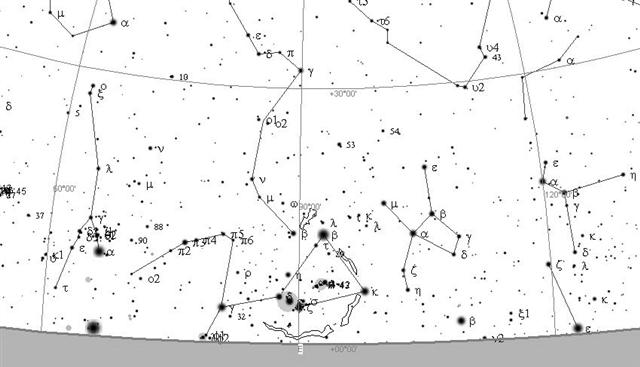 |
| ko te henua -
te rima |
e kava |
i haga rave
ika |
ki kikiu - te
henua |
 |
 |
 |
 |
|
Cb3-3 (392 + 52 = 444) |
Cb3-4 |
Cb3-5 (54) |
Cb3-6 (84 - 29) |
|
CLOSE TO THE SUN: |
|
Dec
7 |
8
(342 = 18 * 19) |
9 |
10 |
|
'Nov
10 (314 → π) |
11 |
12 |
13 |
|
CLOSE TO THE
FULL MOON: |
|
ĸ Leporis (78.0),
RIGEL
(Foot) =
β
Orionis
(78.1),
Flaming Star = IC405
(78.2),
CAPELLA =
α
Aurigae
(78.4),
ο
Columbae,
τ
Orionis (78.8)
*37.0 = *78.4 - *41.4
THUBAN (α Draconis) |
λ Aurigae (79.0), λ Leporis (79.6), ρ Aurigae
(79.7)
ARCTURUS (α Bootis)
|
Shur-narkabti-sha-iltanu-5 (Star in the Bull
towards the north)
σ
Aurigae (80.4),
BELLATRIX (Female Warrior) =
γ
Orionis, SAIF AL JABBAR (Sword of the Giant) =
η
Orionis
(80.7),
ELNATH
(The Butting One) =
β
Tauri = γ Aurigae
(80.9) |
ψ
Orionis (81.1),
NIHAL (Thirst-slaking Camels) =
β
Leporis
(81.7) |
|
June
7 |
8 |
9 |
10
(161) |
|
... The
month, which takes its name from Juppiter the
oak-god, begins on June 10th and ends of July
7th. Midway comes St. John's Day, June 24th, the
day on which the oak-king was sacrificially
burned alive. The
Celtic year was divided into two halves with the
second half beginning in July, apparently after
a seven-day wake, or funeral feast, in the
oak-king's honour ... |
|
'May 11 |
12
(132 = 4 * 33) |
13 |
14
(499 = 365 + 134) |
|
Vaitu Nui 27 |
28 (118 = 4 *
29½) |
29 |
30 |
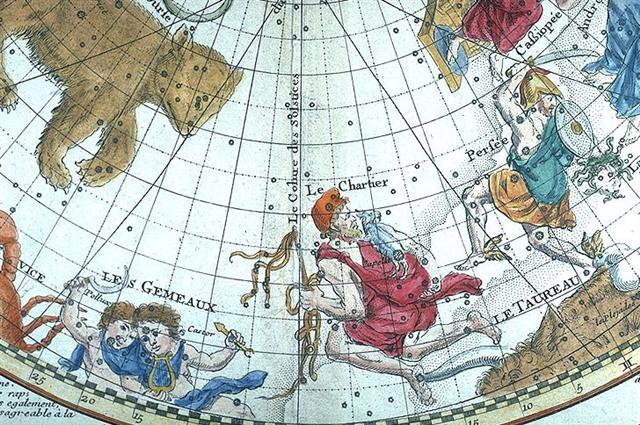 |
| ko te maro
- ko te tagata |
kua hua te
tagata |
ko te
tagata |
25 |
 |
 |
 |
|
Cb3-7 |
Cb3-8 (392 + 57 = 449) |
Cb3-9 (58 = 2 * 29 = 84 - 26) |
|
CLOSE TO THE SUN: |
|
Dec 11 |
12 (346 = 210 + 136) |
13 |
|
'Nov 14 |
15 |
16 (320) |
|
CLOSE TO THE
FULL MOON: |
|
MINTAKA (Belt) =
δ
Orionis,
υ
Orionis (82.4),
χ
Aurigae (82.5),
ε
Columbae (82.6)
*41 = *82.4 - *41.4 |
Al Hak'ah-3 (Brand) /
Mrigashīrsha-5 (Stag's Head) /
Turtle Head-20 (Monkey) /
Mas-tab-ba-tur-tur (Little Twins)
ARNEB =
α
Leporis, Crab Nebula = M1 Tauri
(83.0,
φ¹
Orionis (83.1),
HEKA =
λ
Orionis, Orion Nebula = M42
(83.2),
φ²
Orionis (83.6),
ALNILAM (String of Pearls) =
ε
Orionis
(83.7) |
Three Stars-21 (Gibbon) /
Shur-narkabti-sha-shūtū-6 (Star in the Bull
towards the south)
/ ANA-IVA-9
(Pillar of exit)
HEAVENLY GATE =
ζ
Tauri,
ν
Columbae (84.0),
ω
Orionis (84.2),
ALNITAK (Girdle) =
ζ
Orionis,
PHAKT (Phaet) =
α
Columbae
(84.7) |
|
June 11 |
12 |
13 (164 = 123 + 41) |
|
'May 15 |
16 (136 = 346 - 210) |
17 |
|
"May 1 |
2 |
3 (123 = 152 - 29) |
| manu pao i
te hau tea - kua tu |
manu rere
ki te hau tea - kua tu |
manu rere
ki te hau tea |
kiore -
henua |
|
Pao.
To cut off, to throw a lance. Churchill.
Paopao,
spade, shovel, rubbish, to lacerate, to have
a quarrel with. Churchill.
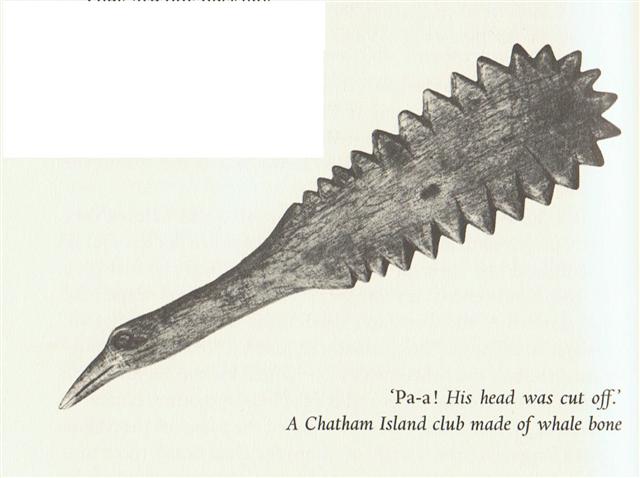
There are 27 teeth around
the tail of the bird above. |
 |
 |
 |
 |
|
Cb4-13 → 14 * 29½ |
Cb4-14 (477 = 392 + 85) |
Cb4-15 |
Cb4-16 (87 = 3 * 29) |
|
CLOSE TO
THE FULL MOON: |
| no
star listed (110) |
ALUDRA (Virgin) = η Canis Majoris
(111.1),
PROPUS = ι Gemini (111.4),
GOMEISA (Water-eyed) = β Canis Minoris
(111.6)
*70.0 = *111.4 - *41.4 |
ρ Gemini (?) (112.1),
Eskimo Nebula = NGC2392 Gemini
(112.2)
ANTARES (α Scorpii)
|
Al Dhirā'-5 (Forearm) /
Punarvasu-7 /
Mash-mashu-Mahrū-10 (Western One of the
Twins)
CASTOR
= α Gemini
(113.4 = 41.4 + 72.0) |
|
July 9 (10 * 19) |
10 |
11 |
12 (193 = 152 + 41) |
|
'June 12 (190 - 27) |
13 (164) |
14 |
15 |
|
"May 29 (190 - 41) |
30 (150) |
31 |
Te
Maro 1 (8 * 19) |
|
... The jaguar learned
from the grasshopper that the toad and the
rabbit had stolen its fire while it was out
hunting, and that they had taken it across
the river. While the jaguar was weeping at
this, an anteater came along, and the jaguar
suggested that they should have an excretory
competition. The anteater, however,
appropriated the excrement containing raw
meat and made the jaguar believe that its
own excretions consisted entirely of ants.
In order to even things out, the jaguar
invited the anteater to a juggling contest,
using their eyes removed from the sockets:
the anteater's eyes fell back into place,
but the jaguar's remained hanging at the top
of a tree, and so it became blind. At the
request of the anteater, the macuco bird
made the jaguar new eyes out of water, and
these allowed it to see in the dark. Since
that time the jaguar only goes out at night.
Having lost fire, it eats meat raw. It never
attacks the macuco ...
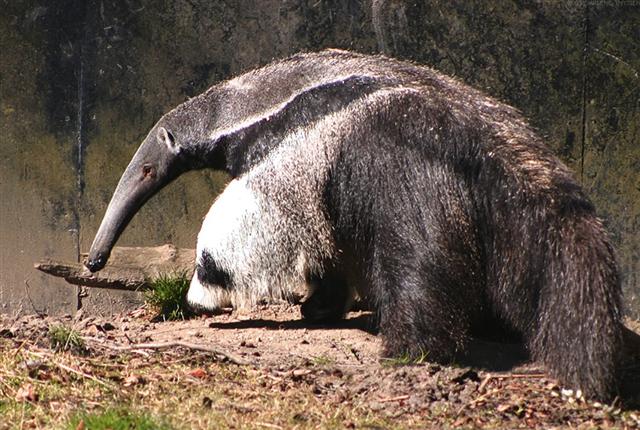 |
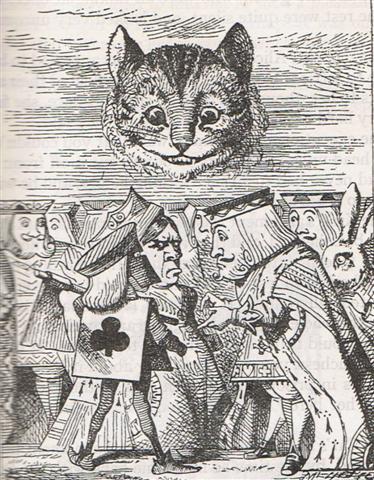
... The players all played at
once, without waiting for turns, quarreling all the
while, and fighting for the hedge-hogs; and in a
very short time the Queen was in a furious passion,
and went stamping about, and shouting 'Off with his
head!' or 'Off with her head!' about once in a
minute. Alice began to feel very uneasy: to be sure,
she had not as yet had any dispute with the Queen,
but she knew that it might happen any minute,
'and then', thought she, 'what
would become of me?' They're dreadfully fond of
beheading people here: the great wonder is, that
there's any one left alive! ...
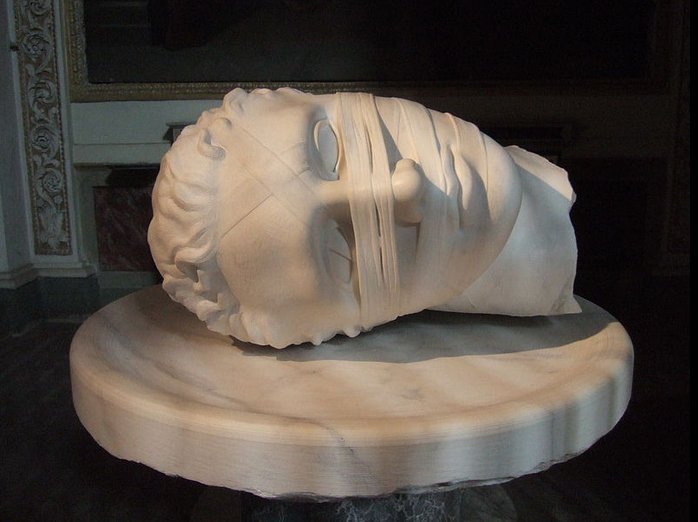
|



















